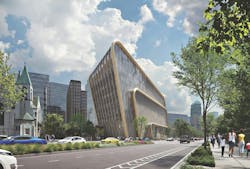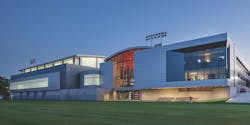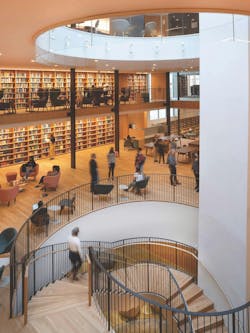Higher education, striving for ‘normal’ again, puts student needs at the center of project planning
Sustainability is a high priority for Des Moines University’s new 88-acre campus for health sciences education in West Des Moines, Iowa, which will include 350,000 sf of spaces for classrooms, labs, a fitness center, admin offices, and parking.
IMEG Corp. is providing engineering designs and services for this $105 million project, which is scheduled for completion next year. (RDG Planning & Design and Turner Construction are on the building team.) The designs for the campus include a 700-well geothermal system for heating and cooling. The campus’s central utility plant will include a 1.0 mW generator with an option to add a second plant. Water-to-water heat pumps connected to the geothermal well field will provide 1,300 tons of cooling and 10,300 MBH (1,000 Btu/h) of heating.
Sustainability and design flexibility are what higher education clients are seeking consistently, according to the dozen AEC Giants contacted for this article. “University campuses across North America are commissioning new construction projects designed to make existing buildings and energy systems more sustainable, and are building new flexible learning space that bridge the gap between remote and in-person learning,” say Patrick McCafferty, Arup’s Education Business Leader–Americas East region, and Matt Humphries, Education Business Leader in Canada region.
Humphries points specifically to the University of Toronto at Mississauga’s Centre for Medicinal Chemistry, which will be the most energy efficient lab ever constructed in ASHRAE Climate Zone 5. The university expects the building to achieve a 60% reduction in energy use compared to ASHRAE 90.1.
McCafferty singles out three recent projects—the University of Virginia’s Data Science Center, Northeastern University’s Interdisciplinary Science and Engineering Complex, and Harvard’s Treehouse Conference and Convening space—as examples that meet demand for flexible yet complex spaces. He adds, too, that every higher ed project now “aims to reduce the overall carbon footprint of campuses.”
Both Buro Happold and RMF Engineering had a hand in Harvard University’s latest campus in Allston, Mass. RMF was involved in the installation of a 54,000-sf district energy facility that provides chilled water, low-temperature hot water, and electrical power to the campus’s buildings. The facility includes a heat-recovery chiller and a 1.34-million-gallon thermal energy storage tank. Buro Happold provided integrated structural and geotechnical engineering services for the campus’s 544,000-sf, eight-story LEED-Platinum certified Science and Engineering complex that offers an adaptable, innovative environment “while showcasing sustainability,” says Susan Sachs, a Partner with Buro Happold.
That firm’s higher ed consultancy, brightspot, was the planner for Smith College’s Neilson Library in Northampton, Mass., which the college touts as “one of the most sustainable libraries in the U.S.” It includes a central oculus for daylighting, a window-to-wall ratio optimized for high performance, sun louvers, and double-pane glass. It uses recycled materials, and its interior is red-list chemical free.
Libraries accounted for 12 of brightspot’s 32 higher ed sector projects in the 12 months ending June 2022. “A lot of libraries are planning for their post-pandemic futures,” says Buro Happold Marketing Manager Sinead O’Connor.
Planning sets stage for robust activity
In collaboration with the Society for College and University Planning (SCUP), brightspot recently released a Campus Facilities Inventory Report, which found that 84% of institutions planned to update or adapt existing facilities over the next year, 80% planned to make major updates to campus infrastructure, and 88% intended to update meeting room technologies for more virtual learning engagements.
Project demand appears to be cutting across building types and learning disciplines. And for most of the AEC firms contacted for this article, science, engineering, and health sciences comprise the bulk of their higher ed new construction or renovation.
The SmithGroup-designed, 175,210-sf Anne Arundel Community College Health and Life Science Building now provides a shared home for the school’s life sciences and biology programs. Its features include Sim-City, medical simulation rooms with operable partitions to allow group events; a white-box theatre with projection and whiteboards that can function as a classroom; a 360-degree simulation theater; and a biology super lab with motorized partitions. The LEED Gold building also has a 160-seat lecture hall, a greenhouse, classrooms and computer labs, study and meeting rooms, and offices.
“Resilience, flexibility, and adaptability are fundamental guiding principles” for designing academic spaces, says Chris Purdy, AIA, LEED AP, SmithGroup’s Vice President–Higher Ed Practice Director. The firm has been seeing more demand for projects with health science programming that addresses regional needs for increased care providers and community health, such as physical therapy.
In May, Colorado State University opened the 80,000-sf Nutrien Agricultural Sciences building that centers the school’s College of Agricultural Sciences at the heart of its campus. Designed by CannonDesign, the Nutrien building features labs and studios on its upper floors, a 180-seat in-the-round auditorium, a student-focused mall that creates storefronts for the building’s programming, and an Innovation Gym for collaboration.
Building college facilities for a return to normal
DPR Construction has seen a steady increase in capital planning activities for renovations, modernizations, and new construction, says Greg Fraikor, the firm’s Higher Education Core Market Leader. “The continued demand for general classrooms, sports facilities, and student housing is being driven by the momentum of students likely returning to a more ‘normal’ on-campus community lifestyle,” he explains. One recent example is the 160,000-sf addition to and renovation of the University of Georgia’s Butts-Mehre Heritage Hall, which Fraikor claims enhances the student-athlete experience as one of the largest sports medicine and strength and conditioning facilities in the country for a Division 1 team.
Athletics and kinesiology, along with STEM, housing, and renovations are the kinds of higher ed projects that HMC Architects has been engaging lately. “Academic buildings and affordable housing are the priorities in California,” says Sean R. Rosebrugh, AIA, LEED BD+C, HMC’s Principal in Charge–Higher Education. At California State University, Fullerton, one such project is expanding that campus’s housing options by demolishing older buildings, eliminating a parking lot, and extending the campus footprint. The new $120 million, six-story building with 600 beds, which HMC designed and Sundt is constructing, is organized so that its three wings, while connected as a cohesive “community,” can also operate autonomously, depending on resident or conference needs. The building is scheduled for completion in August.
The trend toward student “normalcy” might also explain the demand on some campuses for new performing arts centers. At Brown University in Rhode Island, Shawmut Design and Construction has been completing the 94,000-sf Lindemann Performing Arts Center, which is set to open next year and will anchor a future campus arts district, says Ron Simoneau, Shawmut’s Executive Vice President of Education.
SmithGroup is also seeing demand from universities and colleges for multicultural projects that address inclusion, says Purdy. These include a Multicultural Center at Michigan State University, and the College of DuPage’s Student Success Center encompassing a multicultural space.
Demand for higher education building construction still ambivalent
SmithGroup’s higher ed practice enjoyed an increase in business last year, “with students at the core of institutions’ decision-making more than ever before,” says Purdy.
“Coming out of the pandemic, campuses are in a period of reflection, to be prepared for the future,” observes John Holbert, IMEG Corp.’s National Director of Education. Consequently, his firm has been receiving “a tremendous number of proposals” from institutions across the U.S., with focuses on academic health and industrial technology. “Right now, the balance is getting the supply chain and budget to align with designs,” says Holbert.
For some AEC firms, though, demand from the university sector has been mixed. Over the past year, HMC Architects saw a decrease in demand, possibly due to reduced enrollments and lack of reliable funding from California, suggests Ken Salyer, AIA, HMC’s Principal and Higher Ed Practice Leader. LF Driscoll, the construction management firm, also has experienced a slowdown in RFPs across the higher ed sector, and some projects put on hold “indefinitely,” says Trish Mitchell, the firm’s Director of Business Development.
Conversely, Buro Happold saw “a welcomed increase” in demand, says Sachs. And brightspot had around 10 more university projects between June 2021 and June 2022, compared to the previous 12-month period, says O’Connor.
During the past year, architecture firm Kohn Pedersen Fox saw a slight uptick in higher ed project demand, with a “continued focus” on research and innovation districts, says Jill Lerner, FAIA, Principal.
One of her firm’s latest endeavors is the Detroit Center for Innovation, to be located on four acres in The District Detroit, a mixed-use sports and entertainment district between the Motor City’s downtown and midtown. With groundbreaking scheduled for 2023, this $250 million innovation project—whose clients include the University of Michigan and the developers Related Companies and Olympia Development—will feature 200,000 sf of research and graduate education space for UM students in mobility, AI, data science, entrepreneurship, cybersecurity, and financial technology. The initial phase will also include incubator and startup services, residential units, a hotel/conference center, and event space.


